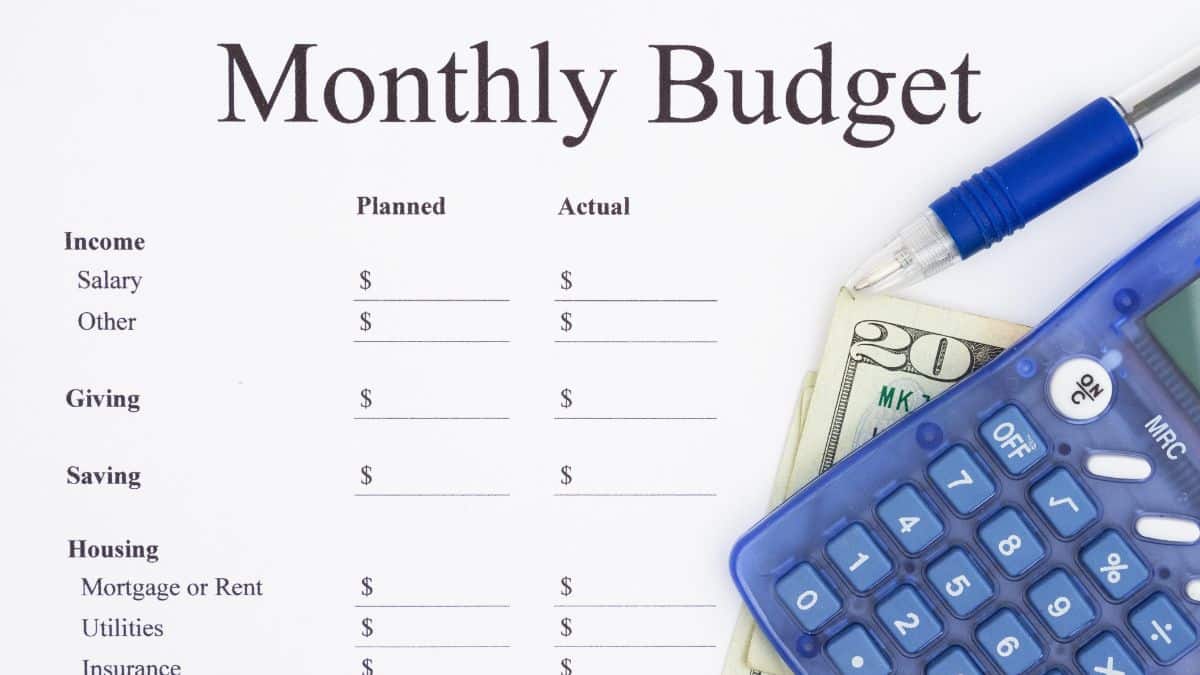Are you sick and tired of being sick and tired? Your finances are out of control, you live paycheck to paycheck, and you are perpetually stressed about money. These eight tips will help you improve your finances…and your life. If you’re struggling with your finances, read through this post and find the strength to take the first step. Just one step. Then another. And another.
8 Steps To Improve Your Finances Today

If you’re reading this article, chances are you’re already aware that you need to improve your finances, but maybe you’re feeling stuck on where to begin.
💸 Take Back Control of Your Finances in 2025 💸
Get Instant Access to our free mini course
5 DAYS TO A BETTER BUDGET
Knowing you need to take control of your finances and knowing how to take control of your finances are two very different things. If you’re ready to see lasting changes in your life, you must actually take the steps to do so.
1. Take Your Financial Inventory

Although this term might be unfamiliar, taking “inventory” of your finances is an important starting point. Think of your financial inventory as a snapshot of your finances as a whole. Understanding what assets you have in “inventory,” and what you don’t have (debts) can be a pleasant surprise or extremely overwhelming.
Grab a notebook and write down every debt you have, along with the balance, and every account you have, along with the balance. Now review this with your partner or an accountability partner. What do you see? How does this make you feel? Having a clear picture of your current financial situation will allow you to set goals and create a plan of attack to improve your finances.
2. Communicate With Your Partner

This is an essential step that cannot be skipped, no matter how scary it may seem, especially if you’ve been down this road before with little success! Let me paint a picture for you: you (and your partner) are miserable. You can never seem to get on the same page and fight all the time about money, and it constantly spills over into all other areas of your life.
Focusing on financial self-care and improving your finances can change your marriage (or partnership) in ways you can’t even imagine. Your best chance for success is tackling your finances as a team, even though it isn’t always easy. Maybe you’ve tried to get your partner on board in the past and failed, or maybe you’re the one who has been unwilling to work together. Make today a new start.
A Few Tips To Get Your Partner in Your Corner

- Always come from a place of love. No one wants to feel pressured or bullied.
- Don’t place blame. This will only put them on the defensive. Take responsibility for your role in your financial mistakes.
- Be patient. Some people are slower to take action and might need more time to think.
- Dare to dream. Talk about your future together and what you want to achieve as a couple and family. This will help you feel united. Then it may be easier to discuss how you can get there…together.
3. Ask for Help

Having someone (other than your spouse/partner) to support your efforts can be crucial to your success. There will be days when you want to veer from your plan, and there will be days when you want to throw in the towel and give up altogether.
Having someone in your corner cheering and encouraging you can make a world of difference. If you don’t have anyone in your family to fill this role, expand your circle. Look for a co-worker, fellow parishioner at your church, or even a mommy (or daddy) friend at school or playgroup. Be sure to check in with them often so they can advise you, help you make tough decisions, and walk with you through hard times.
4. Budget, Budget, Budget

The thought of living on a budget and tracking every dollar you spend can seem incredibly daunting. But your budget is your most important tool for taking control of your finances. Many think having a budget is stifling and restrictive, but a budget offers you control. Control over how you spend and save your money.
A budget allows you to tell your money where to go. It allows you to give it an assignment each month instead of blindly spending with no direction. And here’s the thing….YOU get to decide what to put in your budget. Budgeting takes time and practice, so give yourself about 90 days to find your groove, and give yourself grace because mistakes will happen.
5. Decide on a Plan

If you’re just getting started on fixing your finances, you need a plan. Finding a financial plan that resonates with you is like having a roadmap to financial success. There is no shortage of financial gurus to follow, each having their own personal system for financial success. The good news is that most of them will work – if you do the work – but finding a system that resonates with you is imperative.
Once you embark on your new financial plan, remember that these proven systems are tested. They are tried and true, so following the system closely, at least in the beginning, will be beneficial. Further on in your journey to take control of your finances, it’s important to remember that while the experts are experts for a reason, personal finance is personal. This means that one size does not fit all. And at the end of the day, your financial decisions are your responsibility.
6. Set Financial Goals

Setting smart, aggressive goals is so important when improving your finances. There are no “right” or “wrong” goals, but using this proven system to set your goals will help you stay accountable to them every step of the way.
Setting goals has many benefits, including increased motivation and productivity, mental clarity, and a sense of accomplishment. Not to mention, goal-setting can even make you a happier person.
7. Monitor Your Progress

Consistently monitoring your progress can be extremely motivating. The key here is understanding how you learn best and monitoring your progress accordingly. Are you a visual learner? If so, tracking your progress using visual tools will help you stay excited about your future and remain focused on your financial goals.
If you are a verbal learner, then physically writing out your goals or using a calendar to track your habits would be an effective method to evaluate your progress. Essentially, you just need to find a way of tracking that aligns with your personality because you will be more likely to stick with it.
8. Review and Revise

The final step to taking control of your finances is to consistently review and revise your current financial situation at regular intervals. This means remaining present in the financial aspects of your life. It’s not enough to set goals, make some big declarations, create a budget, and check out.
At this stage of the game, you cannot yet set your finances on autopilot. You must check your accounts, update and reconcile your monthly budgets, and have regular budget meetings with your partner. Not only will it strengthen the new financial habits you are trying to build, but it will ensure you catch any mistakes before they occur and allow you to become more familiar with your finances all around.
Reap the Rewards

Following these eight steps to improving your finances will lead to many positive changes in your financial life. Make the commitment and show up for yourself because you deserve to lead a life of abundance, and no matter how hopeless things may seem right now – it is possible – if you’re willing to do the work.
How To Save Money Fast – 26 Easy Tips

We all know it’s important to save money. But how do you do that when inflation is up, mortgage rates have increased, and rents are rising? Oh, and don’t forget – extra spending is coming with the holidays around the corner. Yet even in tough times, there are strategies to help build savings fast. How To Save Money Fast – 26 Easy Tips
15 Frugal Options That Are Probably a Waste of Your Time

When trying to live frugally, you’d think the obvious money-saving tips and tricks are no-brainers. Frugal hacks taught to you when you were growing up are likely stuck in your mind as cheaper options. But money is not the only factor when it comes to how much things cost. 15 Frugal Options That Are Probably a Waste of Your Time


